During an SHTF scenario, we will often be faced with the choice between bugging out and bugging in.
Each has its pros and cons, and we must weigh the options carefully before deciding which action to take. Often, the choice to bug in is due to the lack of a suitable bug-out location or the inability to leave the area.
It may seem that bugging out would pose the most risk, but there are many mistakes that we can make while bugging in, which could turn out deadly.
Not Maintaining 24/7 Security
One of the biggest threats we can face while bugging in is the threat of other people who would want to take our food, water, and supplies.
Related: 11 Looter-Attracting Items You Should Immediately Hide When SHTF
Regardless of what early warning systems you have in place, not having someone awake and on guard duty could be a fatal mistake.
 Most bad actors who are going to attack your home will do so during the dead of night. This is when you are at your most vulnerable.
Most bad actors who are going to attack your home will do so during the dead of night. This is when you are at your most vulnerable.
During the daylight hours, you will still need to maintain a watch as you go about the various post-SHTF tasks to ensure your survival.
While you are busy and focused on the task at hand is a perfect time for someone to make their move.
Not Helping Those Around You
We don’t want anyone to know the extent of our preparations, but we also need to keep positive relations with those around us.
You will inevitably see neighbors in need; some old bottled water, a few cans of food, some batteries, or medical supplies will go a long way to keep your neighbors from seeing you as a target.
Even if you keep all your preps a secret, those around you will know that you are preparedness minded, and they will notice that you and your family seem to be doing well while others in the neighborhood are struggling.
Not Having An Early Warning System
The best insurance policy against an attack is having several early warning systems to alert you when someone breaches the property line.
These systems can be silent or loud, but they must be hidden well enough so no one can avoid triggering them. Tripwire alarms, pressure switches, cameras, or motion lights are all excellent options.
Related: DIY TripWire Alarm Very Simple and Outrageously Loud (High Security Perimeter)
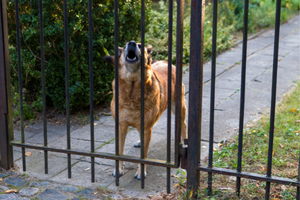 One often overlooked early warning system is a dog. Our canine companions are always on the lookout for threats and will often alert us to threats that we would otherwise miss. Their heightened sense of smell and hearing is nature’s early warning system, and we should make good use of it when bugging in.
One often overlooked early warning system is a dog. Our canine companions are always on the lookout for threats and will often alert us to threats that we would otherwise miss. Their heightened sense of smell and hearing is nature’s early warning system, and we should make good use of it when bugging in.
Keeping Supplies Outside Of The House
All the supplies that you need to survive must be close at hand. Therefore, do not keep anything in outbuildings or outside the walls of your home. The exception would be caches of supplies you would have in separate locations for resupply when you are bugging out.
When bugging in, there may be a situation where it becomes too unsafe to leave the confines of your home. For example, if you keep supplies in sheds, detached garages, carports, or storage units, you may have to put your safety at risk to access these supplies.
Using Combustible Items Indoors
Carbon monoxide is the silent killer, and we should never bring fuel-burning devices indoors. Barbeques or camp stoves must only be used outdoors; even a garage is not a good place to cook using these devices.
Candles pose a fire risk, as do heaters and lanterns, even if they are rated for indoor use. It is always best not to take any chances when bugging in.
Running A Generator
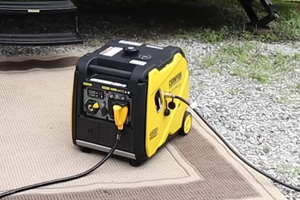 Every time you fire up a generator, you are broadcasting to the neighborhood that you have a source of power that can be easily stolen.
Every time you fire up a generator, you are broadcasting to the neighborhood that you have a source of power that can be easily stolen.
Even if no one around you actively tries to steal your generator, you will find that all your neighbors will be dropping by to ask to borrow the generator.
⇒ How To Produce Your Own Electricity At A Low Cost
Generators always draw far too much attention, and if you do not have any other quieter source of backup power, you should do whatever you can to build a soundproof enclosure for your generator.
Not Exercising Noise And Light Discipline
If you have backup power, you must keep this fact a secret from everyone around you. If you use electric lights and appliances, be sure that their light and noise are not detectable from the outside of the home.
Like a generator, noise and artificial light will draw much-unwanted attention in a world that has gone silent from the absence of electricity.
Keeping blinds and curtains closed, limiting using devices that make noise during daylight hours, and minimizing the use of artificial light, are all ways to exercise light and noise discipline.
Not Having A Bug Out Plan And Set Escape Routes
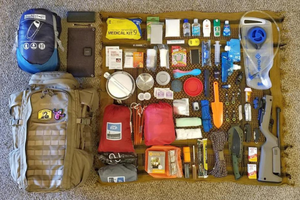 A bug-in situation can turn into a bug-out in a heartbeat. The moment that you need to bug out is not the time to start packing your bug-out bag. Everyone must have their bug-out bags packed and ready to go at a moment’s notice.
A bug-in situation can turn into a bug-out in a heartbeat. The moment that you need to bug out is not the time to start packing your bug-out bag. Everyone must have their bug-out bags packed and ready to go at a moment’s notice.
Related: My 3 Bug Out Bags (with Pictures)
If your bug-out vehicle is parked outside, it should be fully fueled and backed up to the house, with all the required gear staged and ready to load.
You need to have multiple routes out of the area planned in detail and a plan for getting out of the house as well. Comms plans, routes, and actions on encountering obstacles need to be hashed out well before SHTF.
Forgetting About Communications
If you have read many of my previous articles, you probably are well aware of my insistence that amateur radio is a critical component of preparedness. Bugging in is no exception.
Adapting to the changing situation is impossible if you do not know what is happening around you. Ideally, you would have an amateur radio license and HF/VHF/UHF radios through which you can communicate and monitor all amateur radio bands from 160m to 70cm.
Bugging in is sometimes the best solution to an emergency, and if you find yourself in a bug in a situation, it is important not to make any deadly mistakes.
You may also like:
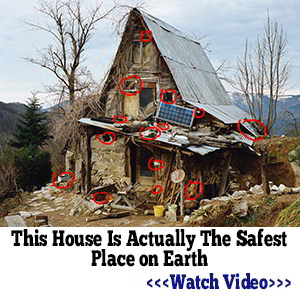 How To Repurpose Old Items Into New Projects For Your Backyard
How To Repurpose Old Items Into New Projects For Your Backyard
The Only Way To Communicate Off Grid In A Crisis (Video)
Your Great Depression Era Recipe for Hard Times

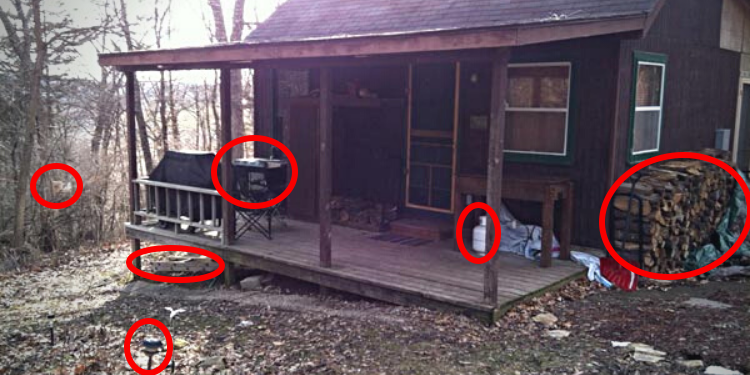













Bugging in when you live in a high population center is lame…… Move and get out of her my people.
Staying in cities is a death trap mentality.
Everyone should have a copy of DeLorme Atlas and Gazetteer for their state and area they are bugging out to. This is a great source of information backroads, trails, rec. sites with GPS grids. And as bonus it’s book of paper maps, no power required!
The idea that you have to bug out is all well and good, but it’s good to also talk about what to do when you can’t bug out.
If you’ve got a mortgage, elderly parents, a city based job that’s not easy to relocate, disabled kids in support networks, blah blah blah so many reasons people feel tied to the city. I find most people who say “you should leave why haven’t you already” are people who are older, have done all the raising of families and are now free to up sticks and move wherever suits them, many in their retirement years (where income is less imperative).
It’s actually very very hard to find reasonable urban prepping advice that isn’t about shooting anyone who looks over your fence or how to hide food in the bulk heads of your ceilings and that you should own a water bob.
People in urban areas really need to stop and rethink whether they need to stay, and then if they decide to… prep for the eventuality of where they are deciding to live.
Another thing to remember is not everyone is prepping for a huge, no notice, cataclysmic event, many are prepping for a long slow decline, with a number of nasty bumps along the way. Or a sudden short term event such as a hurricane. The decision to bug in for both of those events is a valid one for them possibly, assuming that the crisis is short lived, or the needs of the family outweighs the complexity of the slow decline impact. Sure there’s a tipping point in every scenario where bunking out is best, but it’s not best every time for all people.
I’d love to see more posts on how to garden effectively in tight spaces, with low sunlight (due to walls!), How to protect your food from rats and possum and whatever bandits Americans have eating their gardens. I’d love to have conversations around security of property that doesn’t involve guns – firing one of those off in an urban area is problematic in current times. How to rig up a short term solar panel array when you live in an apartment, or what forms of self sufficient energy you can explore. Ways to build a network and find other like minded people. Ways to practice what you are learning without drawing suspicion. How to gain financial independence from mortgages and the rent treadmill. Less shopping, more conversations!
That’s why it’s called preparedness not excuse making. I’ve raised children and did the whole suburb thing. After I realized all the set backs of that lifestyle. I had to have a come to Jesus moment with my self. If your trying to have the cake and eat it too,,,maybe the prepping lifestyle isn’t for you. You just might not be cut out for it. In the real world not everyone gets a trophy.
Try “city prepping” on YouTube. He has great advice for all the things you mentioned and more. I hope this helps.
A butane stove is safe to use inside as butane is lighter than air and will rise and escape through any cracks and crevasses available.
Paul, CO2 from proper combustion is also a problem. CO from incomplete combustion (due to having a well sealed home is lethal.
Would really suck to prepare yet never wake up from your sleep due to over sealed home (maybe from duct taping against radioactive dust?)
Older homes were drafty so having a wood stove, fire place and so on wasn’t much of a problem. Modern home and upgraded older homes are often too tight for a wood stove.
Thus, local stove installers INSTALL an Air pipe FOR the stove.
you have a (chimmey with a wood stove)……… so….
Let me get this right.
” camp stoves must only be used outdoors.”
I guess you mean propane stoves?
Then should I rip out my gas oven that has open burners? Or my Servel gas refrigerator?
I’m so confused! /sarc
in regard to the mix of generator advice and the light/noise discipline mention >>>> one thing not to broadcast your fuel and VIP equipment access weeks into a serious SHTF – but the whole issue of playing “dead & vacant” will do nothing but draw a constant stream of totally unnecessary firefights – going to be people doing nothing but scavaging to stay alive – your dark house won’t be any different than the scores of others around you – ambushing and piling up the bodies will only last as long as your luck ….
I completely agree about the “dark house” comment, especially in an urban area. Not so much out in the country. As you just stated “your dark house won’t be any different than the scores of others around you”. Light and sound discipline will keep it from sticking out and drawing unwanted attention. Smoke from fires can be seen quite a ways off, noise of a chainsaw or generator can be heard for miles sometimes. It’s not the ones and twos that are the major threat. It’s groups that have banded together for one and only one purpose. Looting and Pillaging. They come, they kill, root through your stuff and they leave. Like locusts. Consuming everything they touch. There will be a time period of great strife that will ramp up very fast then taper off very slowly. Out in the “sticks” is gonna be the only way to go. Keeping your immediate neighbors at least alive will be necessary too. As many have correctly said OPSEC is gonna be crucial.
not going to make any difference where the house is located – lack of any living-in signs will be an open invite for someone looking for housing or salvage ….
interesting tidbit from a PAW novelist’s imagination >>> the novel’s central character had neighbors bug out – he created fake occupancy day & night – gave him the opportunity to interview refugees coming thru and choose the best for his new neighbor & mutual support ….
Backup plan – poison some of the supplies in case they steal them and/or kill you to get them.
Just be sure that YOU don’t consume them by mistake.
Scorched Earth policy might be a good idea.
At least you can deter many of them.
Richard: but won’t a totally dark house indicate it is vacant, and therefore either a good place to search for supplies, or a good place to campout for those same looters??? Darned if you do…darned if you don’t!!!
therefore, is good to have a network of neighbors and friends to build a secure area where everyone take turns on watches
We have a 29 year-old profoundly disabled son, as well as three other children thus are not in a position to bug out. We use solar energy, and the solar panels stick out like a sore thumb on our roof. Knowing we have electricity in the event of large blackouts is a comfort, but knowing there would be many who would like to have our house means we have to be heavily armed. As said above, it would be a good idea to limit our use of electricity at night, and to have someone on guard duty at all times. We also have Great Dane and German Shepherd who would let us know if someone even sneezes on our property.
If you cannot stop them from taking your house, BURN IT.
Do not let invaders/criminals gain anything.
Not store anything outside?
Imagine your bunch of gas cans in the house while you use a fuel burning appliance…..
Imagine frustrated looters who can’t pry you out of your house using your own gas to light the house and or vehicles on fire….. Just sayin.
On the other hand, Richard, if looters set your house on fire wouldn’t they be destroying those very supplies stored inside your house?
Sometimes that don’t want your supplies, they want to destroy your independence.
Ragnar Benson
(Or close to it)
All good points but there is no perfect answer when bugging in. Especially in a populated area. Its a dice roll. Having friends or tribe as some call it is essential to survival. Plan for the unexpected. Plan now. Discuss it in as much detail as possible. Survival in the city and towns will be dicey. Unless you have an incredibly remote go to place no SHTF scenario is good. Its tough work. Hope I never see it but have prepared methodically for 40 yrs. Even so, its difficult to prepare for everything. We do what we can with what we have.
I totally agree about the difficulty of being fully prepared. Fully prepared for some people is a generator, a few cases of bottled water, canned food and an AR15 with plenty of ammo. That’s a good start for sure, but leaves a bunch of possibly lethal areas untouched. I’ve only been starting to seriously prep for just the last couple years and one thing i’m absolutely sure of, now, after learning a batch more, is i’m nowhere near fully prepped.
You are SO right Abell. Excellent points. I agree. No matter how well prepared you think you are you can never be completely prepared. There’s always that one extra thing or that extra pack of razor blades or whatever. I’ve been doing the same thing. Preparing for most of my life. That philosophy was instilled in me by my parents. They went through periods of great want and scarcity and ALWAYS had a little extra on hand. My mum had to go through the war as a young girl. My dad ended up in a prisoner of war camp for five years. He almost died there a number of times. When he finally made it back home he was skin and bones. Less than half his normal body. Let’s just say that I took this a step further in light of what we think is coming our way. Before the year ends I still have a small number of items to get. There’s always something. We of the prepared mind NEVER think we have enough. And in some ways we don’t. Remember your barter items. At some point they WILL become very important. DON’T BARTER YOUR AMMO!
And yes, i do keep my gasoline inside my house. Firebugs are occasionally a problem in my area as well as i useta have a crazy tenant who would burn things and had no idea how to use flammable liquids to start fires. Removed his, and anyone else’s easy access to fuel. Also, fuel lasts a LOT longer if it’s thermally stable and in a dry/non-humid environment.
May I ask HOW you’re storing the gas in the house, Richard? I’m sure there are perfectly safe ways to do it but if I did it I would always be worrying about it in the back of my mind. Obviously gasoline vapours are EXTREMELY flammable. You would have to find a spot in the basement as far away from your furnace and water heater as possible. Ideally a spot with a little bit of fresh air flow in case the container starts to leak over time. And then you would have to be very careful picking the right container. Nothing bigger than five gallon containers with a seal that you would be able to trust 1000%. I have a kerosene heater and I store VERY little kerosene in the house. In fact, my clothes dryer is kaput and I store a small jug of kerosene in the clothes dryer. Yes my clothes dryer is unplugged so no chance of it starting up by accident. If my insurance company found out about the kersosene they would instantly cancel my house/fire insurance. Make sure YOUR insurance company never gets wind of it. I would never be 100% comfortable with gas in the house but if you’re fine with then it’s all good. We’re all adults here and we all have to make our own decisions and live with the consequences.
I heard a guy (Vietnam Vet) say once that Preppers provide resupply points for many once the SHTF for real. I thought it was in interesting point.
So he was insinuating that he plans to resupply from preppers?
He’s just another of the long conga line of people who will show up then and ask for help. Treat him the same. Don’t care if he’s a veteran, as much as care that his ‘prepping plan’ was to beg, borrow or steal from others who had prepped. (Being a veteran alone does not make you a noble knight!)
I do like the idea of being part of a community hub of preppers, with a plan to rapidly upskill the daft and slow around me. I’m going to need them skilled up and working if we’re all going to have a good quality of life (I’m talking bugging in/urban prepping here). If I’ve got a wildly disproportionate quality of life to theirs then they’ll just take what I have, so I need them to quickly get up to speed and at least feel like they’ve got skills, resources and a bearable quality of life. They don’t need to know that I’ve got a secret stash of coffee beans, but I really can share with them the work of rigging their gutters for rainwater collection even if they should have done it before SHTF. After all, if they can’t collect enough water to drink for themselves, they are just going to ask me for it and I don’t have enough preps for the world!
So yeah, preppers are a great resupply, but the best supply they’ll share is information and skills. Food in cans only lasts so long before it’s eaten. Hand tools are only necessary at the moment that you need to do something with them. Crops are longer term strategy but unpredictable. Preppers who can help YOU prep though? Help you survive? That’s your resupply, because eventually all that bottled water and fish antibiotics is going to run out, and you’ll all be sitting there looking at each other going “well I’m glad we made all that last as long as it did, so we had time to prepare and build other infrastructure for a longer term improved life”.
Michael makes some good points but instead of investing in generator which is going to be noisy no matter what and stinks when it’s running may I instead suggest investing in a solar panel/battery bank setup. Deep cycle batteries of course. Where I am right now a number of people already have solar panels on their roof so a few more people with solar panels wouldn’t draw unwanted attention. For light I would suggest black out curtains and something like a kerosene lantern so you wouldn’t have to draw on your precious supply of electricity. In the article Michael also mentioned communications and ham radio. It’s a catch 22. In a true extended SHTF scenario the electrical grid would probably be down so if you want to run your ham radio then you need a generator or a battery set up. Running a generator attracts unwanted attention and/or looters. Not to mention the huge antenna strung across your property. I don’t think communications would be our first priority in a serious SHTF. In the first few weeks or months we would have our hands full just trying to survive. Communications would come later once some semblance of order was restored.
Agree, and it’s cheaper/refuels itself! But I imagine looters eventually might come after those solar panels.
One thing I’ve seen/heard/experienced around the traps when the power goes out for a few days is that people do start knocking on doors of people with solar and generators, asking to borrow fridge space or charge phones. Generally someone (in Australia) might set up a generator and run it for a bunch of hours a day so people can come, charge their phones and devices, and get a hot cup of tea and a snag off the BBQ and catch up with the rest of the community at the same time. It really improves local security, it stops people storming that person for resources (and the community protects that as a shared resource for longer), reduces waste and increases overall community morale (which improves a LOT of life experience). Just something to consider – if you are doing generators (or the far superior solar panels), consider setting up in your immediate local area somewhere where during the day a handful of neighbours can quietly charge up their stuff – they won’t steal what you have then, and will help protect it.
Communications – I agree that I’d just be bunkering down and getting ‘independent and off grid’ going before caring about what is happening elsewhere. I’ve got (rechargeable, from solar!) walkie talkies with good power/range, and would keep one quietly on in the background to keep an ear out, but I’m not going to bust my chops trying to work out if Sydney is doing well, while I’m in Western Australia. Eventually I’d want to know, but I assume whomever in Perth has a ham radio would make that their raison d’être and then blast news out on the CB channels at regular times. When I find those I can tune in, but I don’t need to duplicate the entire setup, when I’m going to focus on bringing other things to the (doomsday) party instead. You can’t do everything, and part of bugging in an urban area is learning you can delegate and say “someone else is doing Comms” (Yes, I know several in Perth are!), I’m going to do this other thing instead. I won’t be able to directly support the Comms person doing the ham radio, we won’t be close enough to each other probably, but I’m sure going to listen in.
Spot on.
Here is one prepping item I have never seen anywhere, and it is kind of morbid. What do you do with bodies of the deceased? These could be those who died for lack of medicine, injuries, bullet wounds (think unsuccessful looters), or any number of reasons. You don’t want the bodies left to rot or become sources of disease. If you live in a rural area you could have a pre-dug pit in which to bury them and cover with a layer of dirt each time it’s used. Elsewhere, what can be done to dispose of bodies ?
Those near the coast must consider sea burial.
oops sorry for downvote. missed my finger. backhoe would be good.
One note on communication – Ham, CB, etc walkie talkie type can be blocked or scrambled by TPTB. And if not blocked, constantly being listened to by humans and computers. Use special coded language that only you and small group knows. Further, don’t write a book. Keep chatter to minimum – your position can be tracked and triangulated. And diminish heat sources and find ways to mask yours. Tech is good and getting better. Your worst enemy may not be your neighbor. There are strangers among us.
I’m lights on, front and back…lawn mowed, Leaves blown…come and get some
Killing fields on all sides….O/P’s all over the property